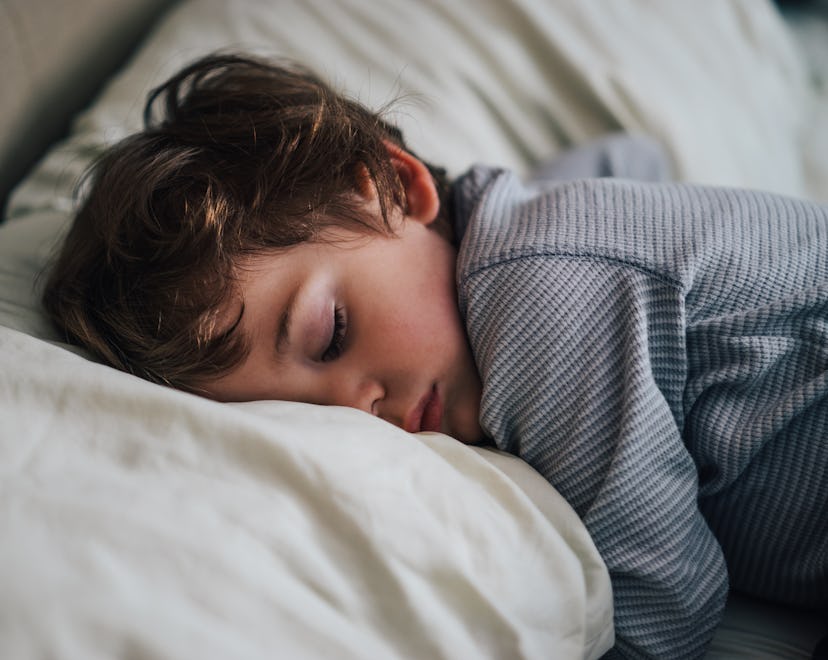Health

Toddler Grinding Their Teeth? Here's When Parents Should Be Concerned
The sound is completely cringey.
Forget about farting. One of the gnarliest noises your child can make is when they gnash their teeth together. And if you’ve ever heard child kiddo grind their teeth, you know that the sound is somewhat intense, like scraping, squeaking, and popping all at once. But instead of chewing their food, they’re crunching their own teeth. If you want to know why your toddler grinds their teeth, (and more importantly, when it will stop), there could be a few reasons why.
What is Bruxism?
Teeth grinding (otherwise known as bruxism) is something a lot of toddlers do — and the sound isn’t for the faint of heart. “Teeth grinding in toddlers and young children can be loud and cringing in sound, and most parents get quite worried,” Dr. Tina Saw, a cosmetic and general dentist and founder of Oral Genome tells Romper. About 14 to 17% of children grind their teeth, according to the American Academy of Sleep Medicine. Teeth grinding can occur during the day (awake bruxism) and while your child is sleeping (sleep bruxism), per a PubMed study.
Why does teeth grinding happen?
Bruxism can begin fairly early in a child’s life. “Some kids begin doing this as soon as they have opposing teeth, and some begin grinding later on in toddler years or even school age/teenage years,” Dr. Erin Issac, a board-certified pediatric dentist tells Romper. But the causes for it can vary depending on your kiddo. “Little ones (think: those that are still teething) often do it because they literally are figuring out that they have these things called teeth in their mouth and that they can do things like rubbing (grinding) together,” she says. “Some slightly older kids do it habitually when focusing intently on a task or conversely, when relaxed, i.e. sitting in front of the TV.”
Will My Child Outgrow Teeth Grinding?
It makes sense that you’d want your child to stop grinding their teeth as soon as possible. And for the most part, it probably will, according to Saw. “Teeth grinding or bruxism in young children is common and often goes away on its own,” she says. Still, some kids continue to grind their teeth off and on well into their teen years. “The majority of younger kids end up stopping on their own; however, sometimes the habit re-emerges later on in teenage or young adult years,” she adds.
When can teeth grinding become a dental dilemma?
If you’ve ever heard your child grinding their teeth, then you can only imagine the dental damage that’s being done inside that small mouth. The good news is that your kid might outgrow it before it becomes a problem. If not, you might find yourself at the dentist’s office — a lot. “Frequent grinding in children can wear down teeth or chip them,” says Saw. “Grinding mainly gets concerning when it continues on and damages their adult teeth or is extremely severe, wearing down their teeth, causing jaw pain and/or exposing the nerve.” You can speak to your child’s dentist at their 6-month checkups to ensure that their teeth are healthy and haven’t suffered any ill effects of bruxism.
When to be concerned about teeth grinding in children
It’s one thing if your child is grinding their teeth at night, but it’s entirely another if bruxism is occurring with other medical issues. “It's important to note that if grinding is accompanied by snoring, mouth breathing, crowded teeth, an open bite, tongue tie, large tonsils, and/or high arched palate, there could potentially be a problem with sleep disordered breathing and this should be evaluated by a pediatric dentist, PCP, and/or ENT,” Issac recommends. “This is because sleep disordered breathing means that the child is not intaking enough oxygen, so their body is in a stressed state, hence the clenched muscles and teeth.”
How to correct teeth grinding in toddlers
Although bruxism can be challenging, it’s something that you’re just going to have to ride out, since most kids eventually outgrow it. “Unfortunately, in young kids if teeth grinding is habitual and not really causing any other problems, there isn't really anything to do about it other than wait it out,” says Issac. “But your pediatric dentist will let you know if they are concerned about wear on your child's teeth related to grinding, and if any dental treatment is necessary to correct the issue.” Since stress can be a contributing factor to teeth grinding, you might want to determine the source of your child’s anxiety to help them feel better — and stop the grinding.
As a parent, all you want to do is protect your child’s precious little pearly whites. But if bruxism begins, you can speak to your child’s pediatric dentist (or an ENT if your child is exhibiting other symptoms) to find out the root cause. That way, your child’s teeth grinding will stop — and won’t grind on your own nerves anymore.
Experts:
Dr. Tina Saw, cosmetic and general dentist and founder of Oral Genome
Dr. Erin Issac, board-certified pediatric dentist
Studies referenced:
Firmani, M., Reyes, M., Becerra, N., Flores, G., Weitzman, M., Espinosa, P. (2015). “Sleep bruxism in children and adolescents.” Revista Chilena de Pediatrá, https://pubmed.ncbi.nlm.nih.gov/26593889/
This article was originally published on